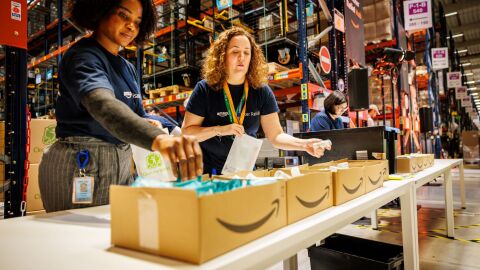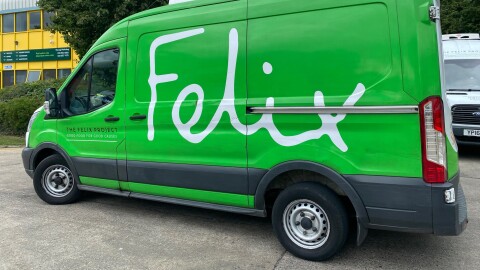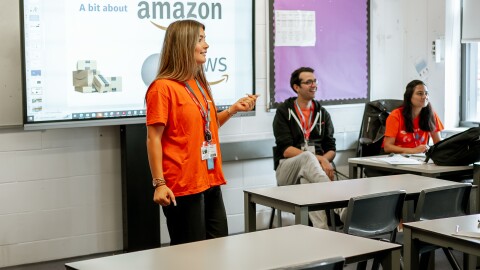To mark the launch of the Alexa Young Innovator Challenge , Amazon hosted our first ever ‘Jobs Fair of the Future’ this week. The event welcomed over 100 secondary school students to Amazon’s Shoreditch office in London to get hands on with the AI-jobs of the future, designed to inspire and excite the next generation of technologists.
Compiled in partnership with futurologist Dr. Ian Pearson, Amazon revealed ten innovative AI and computer science jobs that could be available to young people in the future, from metaverse architects and paramedic drone programmers, to AI sports coaches and environment protection agents.
![AmazonJobsFairoftheFutureEdit_04[1].JPG Drone Flyer](https://assets.aboutamazon.com/dims4/default/9838953/2147483647/strip/true/crop/4000x2666+0+0/resize/1115x743!/quality/90/?url=https%3A%2F%2Famazon-blogs-brightspot.s3.amazonaws.com%2Fa7%2Ff6%2Fe8f4f65b48d496f22ac5355f9a95%2Famazonjobsfairofthefutureedit-041.JPG)
The event was hosted by Alexa Young Innovator Challenge judge and UK Ambassador for Amazon Future Engineer, Lauren Kisser, alongside Youtuber and computing graduate, Tobi Brown, a member of The Sidemen, who will also sit on the judging panel, alongside TV presenter and STEM education advocate, Carol Vorderman MBE; computer scientist and entrepreneur Professor Sue Black; and maths and computing prodigy, and Stemettes founder, Dr. Anne-Marie Imafidon.
“It’s a privilege to be in the position I am in now, because when I was growing up not only was there a lack of role models for me to look up to but, there was also less emphasis and encouragement overall in education about the benefits of tech and digital learning. With a quarter (25%) of 18-year-olds primarily looking for career advice on YouTube, I know that I have a responsibility to share information and help inspire the next generation to consider careers in the tech and digital worlds. The Alexa Young Innovator Challenge is a great way for today’s students to understand their potential in tomorrow’s world of work, so I’m really excited to be part of the judging panel to help inspire more students to develop their computer science skills,” said Tobi Brown.
![AmazonJobsFairoftheFutureEdit_03[1].JPG robot goalie](https://assets.aboutamazon.com/dims4/default/ff46656/2147483647/strip/true/crop/4000x2667+0+0/resize/1114x743!/quality/90/?url=https%3A%2F%2Famazon-blogs-brightspot.s3.amazonaws.com%2Fef%2Fe2%2F0a07f5d4484e824d5e616b7a866f%2Famazonjobsfairofthefutureedit-031.JPG)
Amazon will also host virtual Class Chats with schools across the UK, where Amazon leaders and current apprentices will share insights from their education, career journey, and discuss the future potential of AI with teachers and students. This hands-on experience, and opportunity to engage with technologists at Amazon, comes as research, commissioned by Amazon, reveals that 82% of secondary school teachers believe their students would be more interested in AI and computer science if they had the opportunity to speak to industry leaders in these sectors.
The Alexa Young Innovator Challenge is an exciting new educational programme for secondary school pupils to create an Alexa Skill to promote social good in their community. Secondary schools across the UK can access free AI-training and curriculum-linked materials to engage students, while supporting the development of AI learning in UK classrooms. To win, pupils aged 13+ are being challenged to create a new Alexa skill that focuses on conversational AI for social good, through which they could help solve societal issues ranging from climate change and healthcare, to poverty and homelessness.
Find out more about the jobs of the future below:
- Paramedic Drone Programmer
An AI expert with medical knowledge will ‘teach’ drones to be vital assistants to rescue teams. These experts will programme the drones so they are able to navigate difficult landscapes, retrieve medication from ambulances or hospitals, deliver first aid, and connect to doctors when they need additional guidance to provide emergency treatment remotely.
This could work particularly well in a busy city where traffic prevents access to patients or remote parts of the world where the nearest hospitals are far away.
Skills Required: Coordination Medical knowledge, Problem-solving, Hardware skills, Communication, Calmness
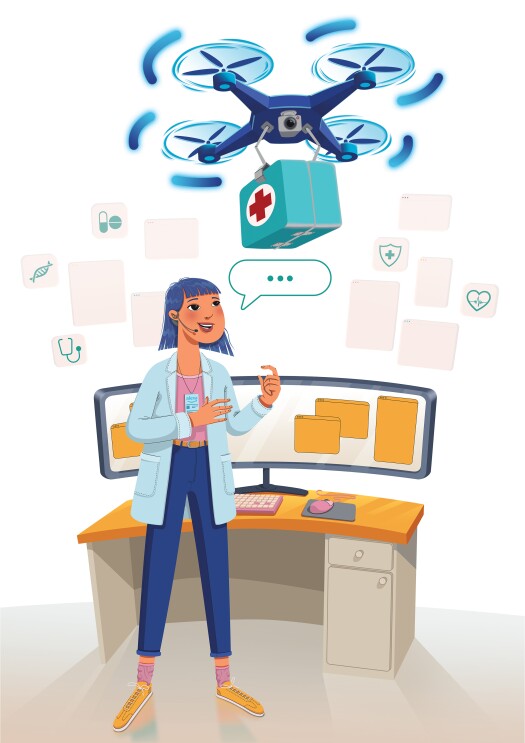
- Smart-assisted Sports Coach
Human sports coaches will use data and AI skills to drive game strategy, both during training and matches. They will measure player movement, predict game outcomes, and adjust in real-time, as well as identify patterns and vulnerabilities in their opponent’s behaviour.
SMART-assisted Sports Coaches will get the best out of a player’s performance, while reducing the risk of injuries - taking sports to a new level of competition and excitement. In today’s games, you can already see players wearing a vest under their shirts which tracks everything from how many steps they’ve run to how many passes they make.
Skills Required: Team sports, Coaching, Data analysis, Augmented Reality, Leadership, Confidence
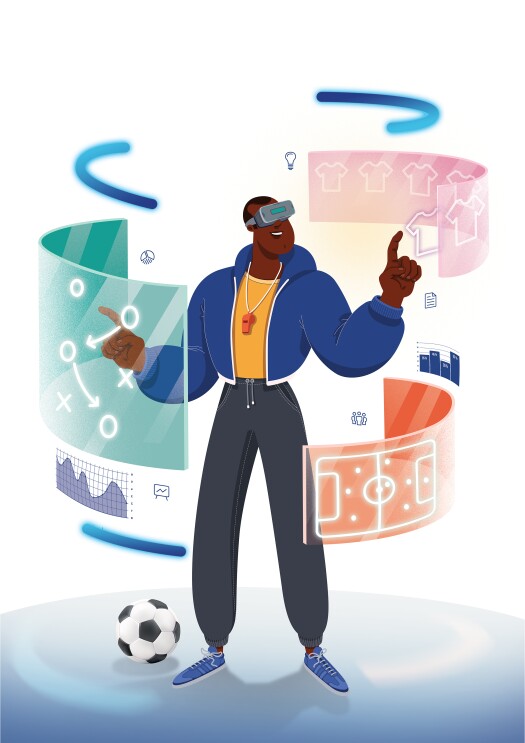
- AI Speech Coach
As it becomes more common for people to talk to AI, the way it responds will become more important. Humans will have a significant role to play in coaching AI to sound more realistic. They will teach pace, accents and even when to be funny.
Visual avatars for our AI will become more common, requiring more natural facial expressions and physical gestures to accompany speech.
Skills required: Language, Speech therapy, Communication, Expression, Acting
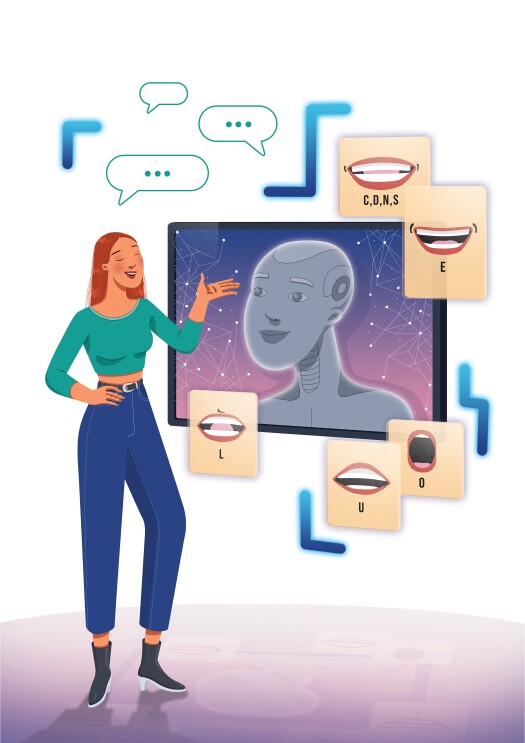
- Metaverse Architect
With an ever-expanding metaverse - the virtual reality world in which humans can interact – metaverse architects will create environments and activities to attract and entertain the virtual reality population.
Architects will use AI to create scenarios based on VR characters’ direct feedback – learning what they like or don’t like, and what they interact with most to design and create unique immersive and sensory experiences.
Skills Required: Creativity, AR/VR/XR/UI design, Programming, Systems engineering, Gaming, Popular culture.
![Alexa_04_Metaverse architect[32].png AYIC AFE](https://assets.aboutamazon.com/dims4/default/527d2c5/2147483647/strip/true/crop/2480x3508+0+0/resize/525x743!/quality/90/?url=https%3A%2F%2Famazon-blogs-brightspot.s3.amazonaws.com%2Fea%2F61%2Fec7bc2bd4ccaaba2b9f5ebfc34b6%2Falexa-04-metaverse-architect32.png)
- Zero Carbon Transportation planner
Future public transport is likely to see driverless pods that fit multiple travellers navigating cities, minimising congestion and energy consumption while taking people on shared journeys to their destinations. Zero carbon transportation planners will programme these pods using AI-enhanced geographical and environmental knowledge to create routes based on real-time needs. As well as travelling more efficiently and sustainably, you will always get a space on your journey.
Skills Required: Engineering, Transport, Geography, Town planning, Organisation.
![Alexa_05_Zero Carbon transportation planner[25].png AYIC AFE](https://assets.aboutamazon.com/dims4/default/96fb259/2147483647/strip/true/crop/2480x3508+0+0/resize/525x743!/quality/90/?url=https%3A%2F%2Famazon-blogs-brightspot.s3.amazonaws.com%2F93%2F25%2Fb108b47649fc8a317c2384aa4980%2Falexa-05-zero-carbon-transportation-planner25.png)
- Augmented Learning Technician
AI and augmented reality will provide children with access to state-of-the-art teaching assistants they can access at any place and time, programmed by human teachers to support classroom-based learning.
Through observations from the teaching assistant and data analysis, AI can help human teachers understand how a pupil learns best, and what they enjoy the most which will help tailor teaching to address any areas of improvement for the student. If students like the way a certain teacher delivers lessons, then the AI will be able to help analyse why, so that the student can have success across other subjects, helping more children reach their full potential.
Skills Required: Teaching, Programming, Patience, Problem solving, Observant
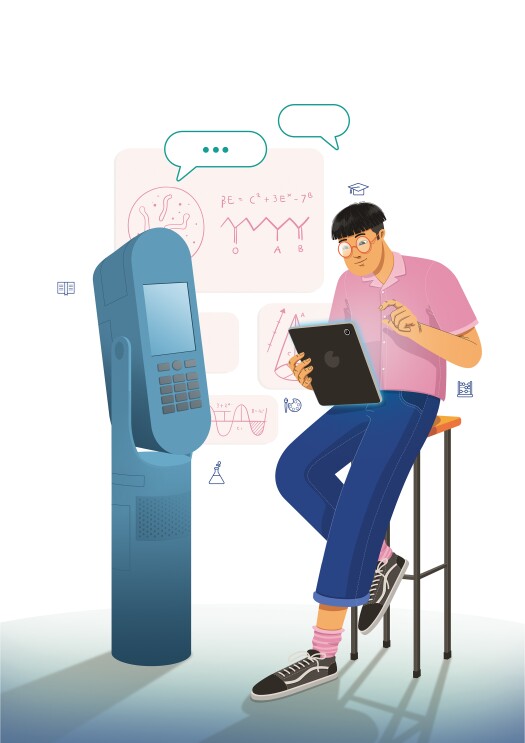
- Agricultural AI Engineer
Future foods will include a wide range of new products made from synthetic meats, fungi, algae and insects, the next step from current meat substitutes like tofu. To farm these foods at scale, farmers will use AI-driven solutions to monitor farms and operate equipment, making everything more efficient. These solutions will predict weather and environmental impact to help farmers manage more sustainable farming methods, make better use of machines, and improve success of tasks such as sowing seeds and weed control.
Skills Required: Food Farming, Engineering, Environment, Cooking & nutrition, Biology.
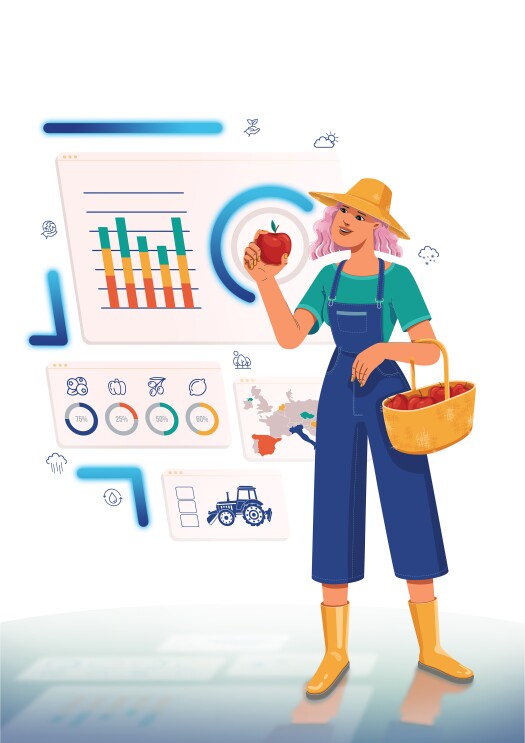
- AI Creative Skills Producer
AI is already being used to compose new music and create art, copying any desired style, but future AI will focus on developing skills in humans using data to improve their creative talents.
This will lead to the production of original songs, music, art and dance that are enhanced by AI, using the skillsets of humans. Designing tools to make this possible requires an understanding of what is lacking in AI music, dance and creative skills technology today, as well as a love of all things art and music, in order to develop AI that enhances creative skills in the future.
Skills Required: Music & arts, Popular culture, Imagination, Creativity, Engineering, Communication.
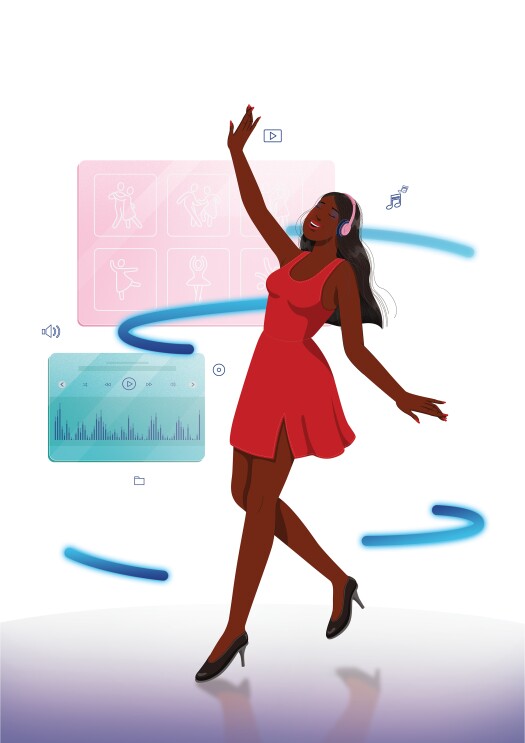
- Community Care Technician
Community care specialists – particularly for those from older generations or living with disabilities – will use AI to detect and address loneliness in the community. The technology will alert care workers who can visit ageing or vulnerable community members should patterns in social engagement become reduced or daily activities change. This will help ensure the best quality of life for individuals.
Skills Required: Empathy, Social skills, Data analysis, Organisation, Patience, Caring.
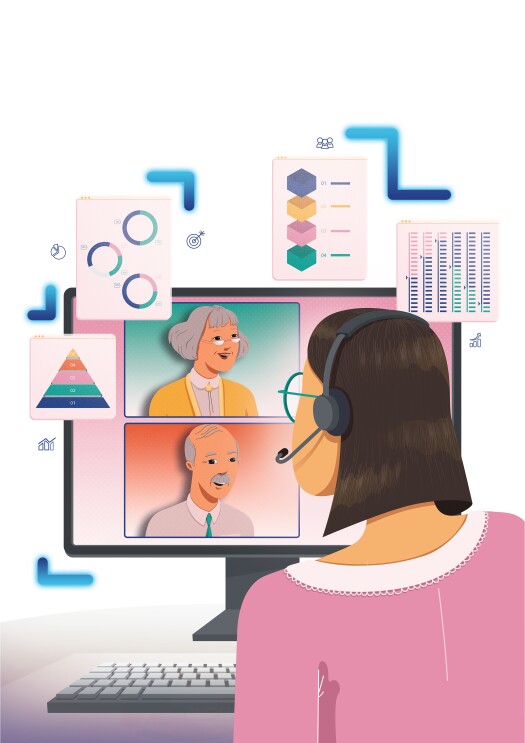
- Tech Fashion Designer
Tech fashion designers will combine their understanding and love of fashion, with technology knowledge to create the next generation of sustainable smart clothing and wearable tech, while reinventing the consumers’ experience.
The use of smart materials will allow garments to react in response to physical and environmental conditions, for example being too hot or cold, reducing the need of layered clothing, seasonal wardrobes and specialised gear. Metaverse catwalks, augmented reality and AI-based digital fitting rooms will enhance customers’ experience, allowing them to discover and ‘try on’ products virtually. This will improve the overall shopping experience and will decrease the carbon footprint of the fashion industry from design to sales, as people will need to buy less and things will last longer.
Skills Required: Design, Fashion, Environment, Culture, Engineering.
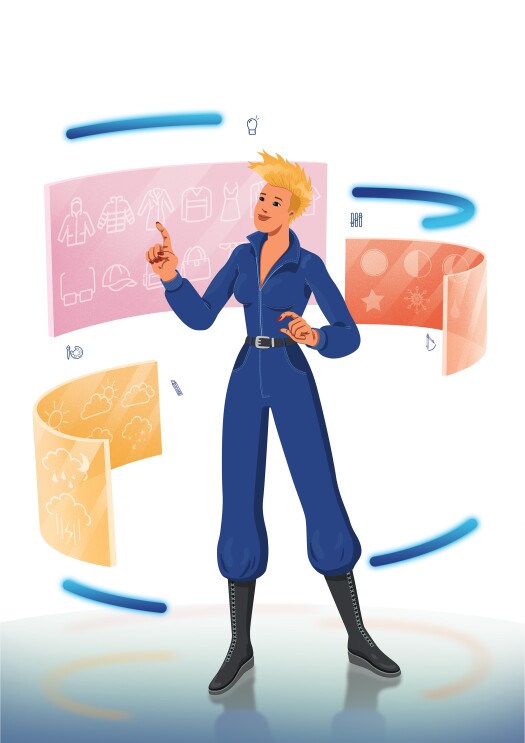
Reinforcing Amazon’s commitment to support the education and skills development of learners from all backgrounds, the Alexa Young Innovator Challenge forms part of Amazon Future Engineer – Amazon’s comprehensive childhood-to-career programme that inspires, educates and enables children and young adults to try computer science and develop coding skills. Since launching in 2019, Amazon Future Engineer has reached over 280,000 students across the UK and through this latest Challenge, it hopes to reach many more.
Find out how to get involved in the Alexa Young Innovator Challenge.





